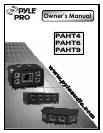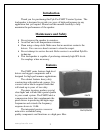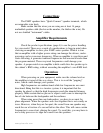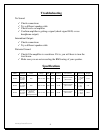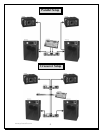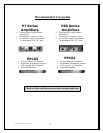
3
Connections
The PAHT speakers have “Quick Connect” speaker terminals, which
accommodate wire leads.
Make certain that the wires you are using are at least 14 gauge
unshielded speaker cable (the lower the number, the thicker the wire). Do
not use shielded “instrument” cables.
Amplifier Requirements
Check the product specifications (page 4) to see the power handling
for your model. There are a couple of considerations to keep in mind when
choosing an amplifier to drive your PAHT series speaker. While it is true
that an amplifier with a higher power rating can damage the drivers, under-
powering can be even more dangerous. When an amplifier is overdriven and
starts distorting, it generates transient frequencies that are much louder than
the program material. These wayward frequencies could damage your
speaker. A proper match is an amplifier which could drive the speaker up to
the cabinet’s RMS rating, without exceeding the amplifier’s own RMS level.
Operation
When powering on your equipment, make sure the volume level on
the amplifier is turned all the way down. This is to avoid the “popping”
noise, which could damage your speaker.
High frequencies are unidirectional while low frequencies are omni
directional. Being that this is a tweeter system, it is important that the
speaker be placed so that the high frequencies reach the intended listeners
properly. Make certain that no person or object could come to interrupt the
line-of-site between the loudspeaker and the audience.
When using more than one loudspeaker, you have to account for
phase alignment. When the speakers are close together this is not usually an
issue. However, when they are far apart, the sound from one speaker may
reach the ear a fraction of a second before the other. This will cause certain
frequencies to cancel out, altering the sound. To avoid this, you may have to
use a delay processor to align the sound from the speakers.



